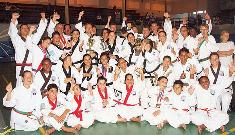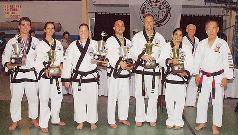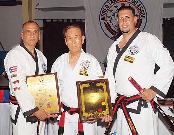courtesy of: The Morning News
written by: Rosalie Klein
 Aruba hosted the Region 18 Championships of the World Tang Soo Do Association Championships at the Betico Croes Sport Hall in Santa Cruz. Grandmaster Jae Chul Shin, Co-founder and President of the association was present along with an international crew of 14 Tang Soo Do Masters from the U.S.A., Costa Rica, Curacao, Cape Verde Islands and Puerto Rico, base of the Regional Director, Master Wilfredo Burgos.
Aruba hosted the Region 18 Championships of the World Tang Soo Do Association Championships at the Betico Croes Sport Hall in Santa Cruz. Grandmaster Jae Chul Shin, Co-founder and President of the association was present along with an international crew of 14 Tang Soo Do Masters from the U.S.A., Costa Rica, Curacao, Cape Verde Islands and Puerto Rico, base of the Regional Director, Master Wilfredo Burgos.
Tang Soo Do is a martial arts discipline originating in Korea and the World Tang Soo Do Association has over 150,000 members in 38 nations around the world. Grandmaster Shin is the author of several books on Tang Soo Do, and was himself featured as a chapter in the 1971 book, “20th Century Warriors: Prominent Men in the Oriental Fighting Arts;” he maintains his dojo in Philadelphia, Pennsylvania.
Competitors squared off in 3 categories: Weapon, Hyungs, and Sparring; medals for first, second and third were awarded in each individual event. Grandmaster Shin distributed the trophies for Overall Champions in Men and Women Division, Boys and Girls, and 35+, Men and Women.
 The trophy winners were:
The trophy winners were:
- Youth Champion Men: Luis Fragoso of Puerto Rico
- Youth Champion Female: Valerie Torres of Puerto Rico
- Women’s Champion: Stephanie Solognier of Aruba
- Men’s Champion: Eziel Eloy Martinez of Puerto Rico
- Men’s Champion 35+: Eduardo de Veer Jr. of Aruba
Melissa Noguera of Aruba, organizer of this year’s championship event and founder of Gihae Tang Soo Do Aruba dojo, won the Women’s 35+ Overall Champion trophy.
 Tang Soo Do, which means “China Hand Way,” dates back around 2,000 years, based upon techniques adopted from Chinese warriors of the T’ang Dynasty. The techniques were merged with native Korean fighting arts, such as Soo Bahk Ki, Tae Kyon, and the suite of military skills known as Kwon Bup. It is reported that modern Tang Soo Do bears little resemblance to these ancient fighting systems. One member of the local dojo and parent of a competitor describes the discipline as “more respectful, particularly during competition; they are fighters, but movements are controlled so only a touch will decide a point-it is not so aggressive and there are far less injuries during meets.”
Tang Soo Do, which means “China Hand Way,” dates back around 2,000 years, based upon techniques adopted from Chinese warriors of the T’ang Dynasty. The techniques were merged with native Korean fighting arts, such as Soo Bahk Ki, Tae Kyon, and the suite of military skills known as Kwon Bup. It is reported that modern Tang Soo Do bears little resemblance to these ancient fighting systems. One member of the local dojo and parent of a competitor describes the discipline as “more respectful, particularly during competition; they are fighters, but movements are controlled so only a touch will decide a point-it is not so aggressive and there are far less injuries during meets.”